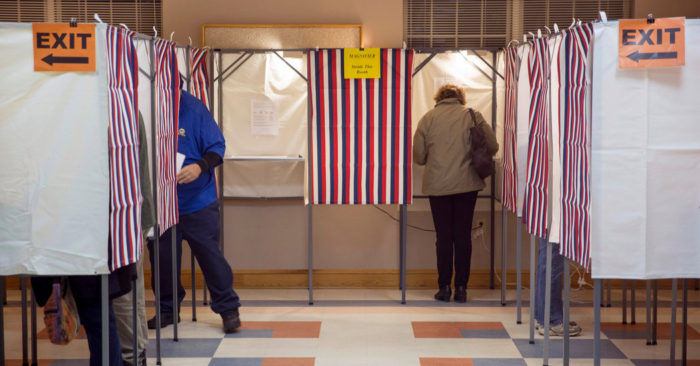

CAMBRIDGE, Mass. — A great deal turns on Tuesday’s primary elections in Maine. For the first time in America, ranked-choice voting — a system likely to reduce political polarization — will be used to choose candidates for governor and Congress. And the system itself, approved by Maine voters in 2016, will also be on the ballot, as a referendum. If voters rescind it, Maine will return to the prevailing system in this country — one that often elects leaders who lack majority support, and turns off many citizens.
Besides losing the national popular vote in 2016, President Trump got less than 50 percent of the vote even in six states he won. What made that possible was the plurality-rule voting system, in which each voter opts for a single candidate, and the winner is the candidate with the highest vote total, even when short of a majority. Plurality rule is used by all states in presidential voting and every state except Maine for elections for Congress and governor. But, by electing candidates whom most voters haven’t chosen, it aggravates polarization.
Moreover, it often deters appealing candidates. Mr. Trump and Hillary Clinton were unpopular in 2016; a late Gallup poll rated their unfavorability at 62 percent and 57 percent, respectively. Both Bernie Sanders (the darling of liberal young people) and Michael Bloomberg (supported by numerous moderates) might have made an attractive candidate as an independent. But both stayed out of the general election because they understood that, under plurality rule, they would be splitting the anti-Trump vote with Mrs. Clinton and helping Mr. Trump to victory.
Ranked-choice voting — now being tested in Maine and increasingly in use in municipal and county elections across the country — helps solve both problems. Under this system, a voter ranks all candidates in order of preference. If no one is ranked first by more than 50 percent of voters, the candidate least often ranked first is dropped. The process then repeats until a candidate does achieve 50 percent of the top ranking. In that sense, that candidate has majority support and wins.
more recommended stories
 Fentanyl Seizures at Border Continue to Spike, Making San Diego a National Epicenter for Fentanyl Trafficking
Fentanyl Seizures at Border Continue to Spike, Making San Diego a National Epicenter for Fentanyl TraffickingFentanyl Seizures at Border Continue to.
 Utah Man Sentenced for Hate Crime Attack of Three Men
Utah Man Sentenced for Hate Crime Attack of Three MenTuesday, August 8, 2023 A.
 Green Energy Company Biden Hosted At White House Files For Bankruptcy
Green Energy Company Biden Hosted At White House Files For BankruptcyAug 7 (Reuters) – Electric-vehicle parts.
 Former ABC News Reporter Who “Debunked” Pizzagate Pleads Guilty of Possessing Child pδrn
Former ABC News Reporter Who “Debunked” Pizzagate Pleads Guilty of Possessing Child pδrnFriday, July 21, 2023 A former.
 Six Harvard Medical School and an Arkansas mortuary Charged With Trafficking In Stolen Human Remains
Six Harvard Medical School and an Arkansas mortuary Charged With Trafficking In Stolen Human RemainsSCRANTON – The United States.
 Over 300 People Facing Federal Charges For Crimes Committed During Nationwide Demonstrations
Over 300 People Facing Federal Charges For Crimes Committed During Nationwide DemonstrationsThe Department of Justice announced that.
